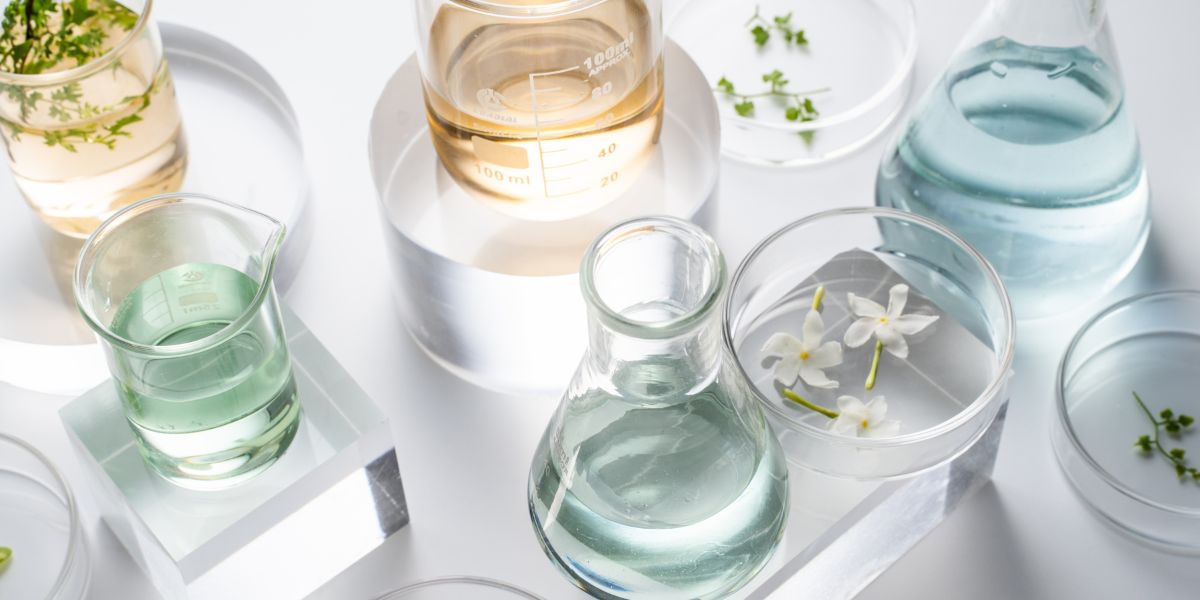Are any of our Glow Getters science lovers? 🙋♀️🧪 We vividly recall attending our "Intro to Chemistry" classes and learning about the chemical composition of the world around us. Everything, from the air we breathe to our very own bodies, is made up of some combination of chemicals.
This idea of the basic, fundamental design of ourselves and our environment is not new, nor is it something to cause an uproar over. The fact is that we are made of chemicals, and many of these same elements make up the items we use in our everyday lives.
Despite this common knowledge, in recent years, the skincare industry has witnessed a surge in the popularity of products marketed as “chemical-free.” From cleansers to moisturizers, these items promise purity and safety, tapping into consumer concerns about synthetic ingredients and their potential health risks.
Enter the rise of the "clean skincare routine."
While the intention behind this branding might seem noble, a closer inspection reveals a misleading narrative that oversimplifies the science and beauty behind skincare.
That’s on the PERIODic table
First and foremost, let's debunk the term “chemical-free.” As mentioned earlier, everything is composed of chemicals. Therefore, claiming a skincare product is “chemical-free” is scientifically inaccurate and misleading #facts
Quick Chem lesson for the curious reader🤓
Every chemical known to us is made up of the basic elements on the periodic table. Some of these elements naturally love to bond to one another, like hydrogen and oxygen—That’s how we get chemicals found in nature like water (H2O). Other elements need a little more encouragement to get together. This is how we get lab-made, or synthetic chemicals.
When brands label their products as chemical-free, what they likely mean is that their products are free from certain synthetic or potentially harmful chemicals. However, this distinction is rarely made clear to consumers, leading to widespread misunderstanding and fearmongering. We’re made to assume that all chemicals are bad, which couldn’t be further from the truth.
Natural vs. Synthetic
The fearmongering around chemicals in skincare products stems from a lack of understanding of chemistry and toxicology. Just because an ingredient is synthetic doesn't automatically make it harmful. Conversely, just because something is natural doesn't guarantee its safety. Take the hyaluronic acid found in plenty of effective skincare products. It is a synthetically made chemical trying to replicate what is found in our body. Poison Ivy, a naturally growing plant, however, is one we wouldn’t willingly use on our skin (for obvious reasons).
You’ve likely heard this before: “The dose makes the poison.” That is to say, the concentration of the chemical makes all the difference. Sure, some synthetic chemicals can be harmful in certain concentrations or combinations, but don’t be fooled, many naturally derived substances can also be irritating or allergenic, particularly in high concentrations. Ask anyone who’s suffering from coconut oil damage to their hair 🫠
The Lab Coats
We often discredit our troops in science by leaning on labels like “natural,” “organic,” and “clean” → Marketing terms that bear little weight in terms of how well a product actually works. Synthetic compounds usually undergo rigorous testing and quality control measures, ensuring consistency and efficacy. Many synthetic ingredients are developed specifically to address skincare concerns like acne, aging, and hyperpigmentation.
By demonizing all synthetic chemicals, we risk overlooking potentially groundbreaking innovations that could revolutionize skincare.
Another issue with the “chemical-free” classification is its suggestion that natural ingredients are inherently superior. While natural ingredients can certainly offer benefits, they’re not always more effective or safer than their synthetic counterparts. Natural substances (meaning that they were grown in the ground), can vary in composition due to factors like climate, soil quality, and harvesting methods, leading to inconsistency in skincare products.
The Key Takeaway
We aren’t suggesting you take off your critical thinking hat when it comes to products that contain synthetic chemicals, we only recommend leaving it on for the “natural” stuff, too.
The emphasis on “chemical-free” skincare can distract consumers from other essential factors in skincare product safety, such as formulation stability, packaging, and proper usage instructions. Instead of focusing on whether a product contains synthetic chemicals, you should prioritize factors like pH balance, preservatives, allergen testing and results-driven data.
What Now?
What does critical assessment look like when walking down the skin care aisle of your local drugstore? Instead of falling for the allure of au naturel labels, educate yourself on skincare ingredients that meet your individual needs. Prioritize products backed by scientific research and transparency. Look for companies that disclose their ingredient lists clearly, conduct thorough testing, and adhere to regulations.
There are also plenty of sites like INCI Decoder, and many others like it, that have accumulated a database of popular product formulations that simplify their ingredients list. They will also share more information about the different ingredients, allowing you to make more educated decisions when purchasing your fave skincare products.
All in all, the concept of “chemical-free” skincare is a misleading marketing ploy that oversimplifies the super cool science of chemicals. Rather than vilifying all synthetic chemicals or blindly trusting natural ingredients, consumers should adopt a more informed approach to skincare product selection. We hope this article helped lead you down the path to finding the right chemicals for you!

